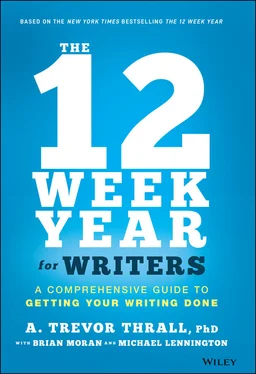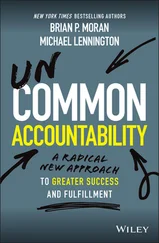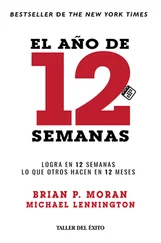Clarify your writing vision and increase the energy and motivation you bring to your writing
Connect your daily actions with your vision via a 12 Week Plan for your writing
Focus on only the most important tactics necessary to reach your writing goals
Create a healthy sense of urgency and motivation by shortening your planning horizon to twelve weeks
Reduce your stress about hitting goals by increasing the predictability and consistency of your writing
Build confidence in your ability to accomplish whatever writing projects you can imagine
Identify and resolve problems in your writing more quickly by reviewing your performance on a weekly basis
Reduce your anxiety by clearly identifying when it is time to write and when it is not time to write
Improve your work/life/writing balance by ensuring that your weekly schedule provides adequate time for each
Keep your projects on track by providing a weekly routine that reinforces your ability to get your writing done
I need to start by thanking Michael Lennington, coauthor of The 12 Week Year , for more than two decades of friendship and inspiration. This book never would have happened if he had not sent me a binder full of the materials that would eventually become known as the 12 Week Year just when I needed it most.
I also need to thank two decades worth of undergraduate and graduate students for enduring both my plentiful writing assignments as well as my advice about how to get their writing done. Special thanks go to the graduate students with whom I have written everything from conference papers to edited volumes. Interacting with students not only fueled my love of teaching and talking about writing, but it taught me more about the craft than I have learned from any book.
No book would be ready for prime time without a healthy review process. I'd like to thank Dominik Stecula, Matt Fay, John Glaser, John Allen Gay, Ryan Nuckles, Michelle Newby, Marcy Gray, Megan Hocking, Keely Thrall, Erik Goepner, and a few others who shall not be named, for invaluable comments on the first draft. They can take credit for most of the good bits; the mistakes are all mine.
Last but very much not least, I want to thank my family. My kids have graciously put up with a year's worth of near-constant chatter about the book and the 12 Week Year. They have read my drafts, given me great feedback, and been endlessly encouraging (my daughter, Eliza, deserves a special tip of the cap for her close reading of the book). But in the end, nothing I have accomplished throughout my career could have happened without the partnership and support of my wife, Jeannie, and this book is no exception. She has always been my first and last reader. I'm looking forward to writing our next chapter together.
SECTION I WHY YOU NEED A NEW WRITING SYSTEM
CHAPTER 1 WHY YOU NEED A NEW WRITING SYSTEM
Do you ever wonder how some writers seem to crank out story after story, article after article, book after book? Or why it is that so many people dream of writing a novel, but so few ever do? Whether you are a blogger, a researcher, or an aspiring novelist, how would your life change if you could consistently produce your best writing?
If there is a writer out there who hasn't spent time trying to figure out how to get more writing done, I haven't met that person yet. Getting written work out the door isn't just hard for full-time writers; it's the hardest thing to do for many professionals, especially because most of us must also deal with other, often more urgent, professional and personal demands every day. Whether the goal is to finish another post, finish a lab report, write a book, or finish your dissertation, figuring out how to write given your hectic schedule is a critical task. Figuring out how to do this while staying sane and living a happy life is even more important.
Since you're reading this there is a good chance that you have worried at some point about whether you're one of those people who can't get organized or just can't finish things. If this is you, I have two messages for you: First, you are not alone, second, yes you can.
Everyone who writes for a living must cope with the unique challenges of writing. It can be lonely. It requires enormous faith, patience, and emotional reserves to see a long project through. No one gets a free pass. Writing is hard, even for famous writers. E.B. White, author of Charlotte's Web , once remarked that, “Writing is hard and bad for the health.” The German novelist and essayist Thomas Mann once noted that, “A writer is someone for whom writing is more difficult than it is for other people.” My own experience confirms this truth. Having worked in writing-oriented jobs for over thirty years, I can still struggle to find the inspiration to write an op-ed, hammer out a blog post, or drag a manuscript over the finish line.
The most common label for this problem is writer's block. But in fact, as experienced writers will tell you, the phrase “writer's block” is something of a misnomer, because only in a minority of cases is a writer truly unable to put words down on paper or on the screen. This does happen, certainly, and when it does it can be crushing. The list of well-known authors who have struggled with writer's block and even left books unfinished is a lengthy one. Gustave Flaubert, the author of Madame Bovary , once wrote: “You don't know what it is, to stay a whole day with your head in your hands trying to squeeze your unfortunate brain so as to find a word.”
But rather than a complete inability to put words to the page, writer's block is more likely to be shorthand for one of the many challenges that crop up throughout the writing process. In my research into the problems writers have getting their work done, the most common of these include:
- Lack of productivity
- Lack of focus
- Fear of failure/negative reviews/lack of confidence
- Lack of inspiration
- Lack of motivation/burnout
- Feeling overwhelmed/unsure how to start
- Procrastination/missed deadlines
- Lack of time to write/inefficient time use
That's a daunting list. And unfortunately, it is a list that most people are all too familiar with. Worse, many people feel that these challenges are proof that they are bad writers. These feelings have prevented a lot of people from writing a lot of things.
The nature of the writing process is partly to blame for this. Writing is a lonely process. Even if you are working with a co-author or a whole team, eventually it's just you, the keyboard, and a blank screen. Of course, many of us gravitate toward writing-heavy careers for this very reason – we like working alone. A big downside of working solo, however, is the lack of feedback about what is normal and what isn't. It is easy for writers who are holed up in their cubicles, studies, or offices not to realize how common the problems are that they're facing. Alone with their troubles, people beat themselves up for their perceived shortcomings, which makes grappling with those challenges that much more difficult.
On top of this, like any creative process, writing takes a lot of emotional strength. You have only your own wits and grit to rely on to finish your writing, and once you share it with the world, everyone will judge you for it. Sure, you get the glory if they love it, but you also get all the criticism if they don't. Sharing our writing makes most of us feel incredibly vulnerable. That fear can stop us in our tracks before we begin, or it can keep us from submitting that manuscript even after we've finished it. Fear is just one of the challenges writers face.
Writer's block can strike right at the beginning of a project when you don't know where to start or maybe even what to write about. This sort of block appears quite often among graduate students who are paralyzed by the prospect of picking the topic that will define them as scholars. It also afflicts professional writers who are bored of their usual genres and topics and have no idea what to do next. Many people have trouble getting started simply because they hate writing or find it boring or difficult (this explains why so many projects get finished the night before they're due).
Читать дальше












